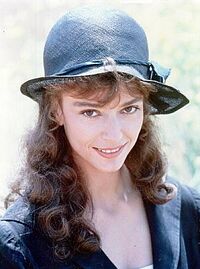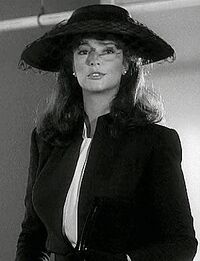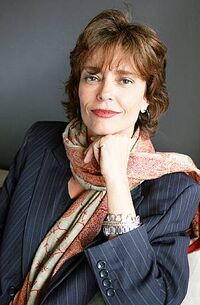Leonora Weeks
Leonora Weeks | |
|---|---|
 Leonora Weeks in 1983 | |
| Born | 7 May 1957 |
| Nationality |
|
| Occupation |
|
| Years active | 1977–present |
Claire Leonora Weeks (Gylic transcription: Kylér Leonora Uíkys; born 7 May 1957) is an Allamunnic–Gylian actress, model, screenwriter, and director. She earned renown in the 1980s as a character actress, specialising in comic relief-like roles where her serene disposition served to lighten otherwise serious works. She starred in several seminal mounoir films during the decade, and remains strongly associated with the style.
Early life
She was born in Allamunnika on 7 May 1957. She has one sister, one brother, and two half-brothers. She was named after the reverse of her mother's name, Leonora Claire Weeks. She is known as "Claire" among family and friends, but when she began her entertainment career, she chose "Leonora Weeks" as her stage name because she thought it sounded better, which sometimes caused confusion with her mother, who received tax bills meant for her daughter.
The family moved to Gylias in 1963. She attended primary school and secondary school. After finishing secondary school, she became a photographic model.
Career
Leonora began her career as a model, during which time she appeared on the covers of magazines like teen, The Travelling Companion, and the Mişeyáke Metro Mail. After several years studying acting, she made her on-screen debut in 1981.
She described her early career in an interview with bavarde:
"When I first started modeling, I'd get compared to Isabel Longstowe, because of the way I talked and because I was quite nervous. Then people saw me smile and forgot all about that and compared me to Victoria Douglas or Brigitte Nyman — all these actors I didn't really know much about, yeah? So I went and watched their films because I was curious how I reminded people of them. I guess I can say after that, I approached my career more knowingly. I thought, yes, combining Isabel and Victoria is a good summary of what I'm doing."
Mounoir

Leonora's breakthrough role came in 1982 with Gylida, a no-budget film directed by art school acquaintance Tede Razeş with a skeleton crew. Playing the titular character, she was the only actual cast member, with the film resorting to clever editing and staging tricks to give the illusion of a larger cast.
Gylida became a sleeper hit, earning good reviews and gradually earning a cult following. Its fusion of film noir trappings, art-school sensibilities, and politically-charged sarcastic humour became the basis of a subgenre that was termed mounoir — Gylian films that used noir visual elements while being cozy mysteries or comedy mysteries in spite of appearance.
Leonora went on to star in several more seminal mounoir films, reprising her successful collaboration with Tede. Her renown was reflected in the caliber of co-stars she was now paired with: Reda Kazan in Softboiled (1984), fellow mounoir mainstay Jen Wood in Night's Edge (1985), and Carla Miló in Fraganza (1987).
Her characters remained largely constant: bearing unisex names like Alex, Frankie, or Robin, they were usually private investigators or amateur sleuths with day jobs. They fulfiled the role of "good femme fatale", combining the archetype's seductive wiles with a happy personality and strong hatred of injustice, and actively driving the plot as protagonists. Further contrasting with the genre's trappings, her characters were shown in happy relationships or marriages.
She jokingly observed in an interview:
"I don't think I played a girl with a girly name until I took a break from mounoir. Before that, it was always Tracy this, Val that…I must've gone through the whole namebook! [laughs] I've worked with a lot of smart people who had the same thought: giving my character a boyish name made me more intriguing."
Character actress
Leonora leveraged her mounoir fame into a steady career as a character actress. By the 1990s, she was described by Downtown as "one of Gylias' most beloved and easily recognised character actors".
Leonora's distinctive character type evolved out of her "good femme fatale" turns in mounoir. She fulfiled a comic relief-like role, appearing in works where her sunny and easygoing characters helped lighten the otherwise dark or serious tone, and gave the audience at least one character to sympathise with.
Keie Nanei wrote in Antichronos that Leonora moved from the "using the past to comment on the present" method of her mounoir roles to a general "fish out of water" approach, playing characters that "seemed to have wandered in from another movie or genre entirely" and thus playfully destabilised the tone of the movie and relieved tension.
Starting in the 1990s, she regularly collaborated with Dreamwave Productions, becoming notable as an established actor who joined its stable of regular collaborators rather than one who gained fame through working with the company.
Other work
Leonora is also a screenwriter and a director for film and television.
She has occasionally collaborated with musicians. She appeared on several tracks from Molly Thompson's double album The Big Heist, reprising her typical mounoir role of "good femme fatale". Molly had already sampled lines from her films occasionally on previous albums.
She was interviewed for Rasa Ḑeşéy's documentary Beloved Rascals (2017), commenting on how she felt the wicked–evil distinction benefited her career by priming audiences for "people who look like femmes fatales but are actually good people" — the character type that brought her fame.
She was an independent candidate in the 2019 presidential election, finishing fifth in first preference votes and not advancing to the final round.
Personal life
She has been married to her husband since 1983, and the couple have three children.
